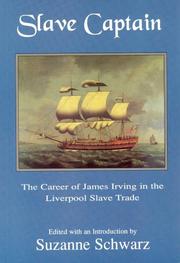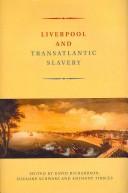| Listing 1 - 5 of 5 |
Sort by
|

ISBN: 9781846314070 1846314070 9781781388419 1781388415 1846310679 9781846310676 Year: 2008 Publisher: Liverpool : Liverpool University Press,
Abstract | Keywords | Export | Availability | Bookmark
 Loading...
Loading...Choose an application
- Reference Manager
- EndNote
- RefWorks (Direct export to RefWorks)
As few accounts written by slave ship captains are known to have survived, the personal papers of James Irving are of tremendous interest and academic significance. Irving built a successful career in the slave trade of eighteenth-century Liverpool, first as a ships surgeon and then as a captain. Remarkably he was himself enslaved when his ship was wrecked off the coast of Morocco and he was captured by people described as wild Arabs and savages. This edition of forty letters and his journal reveals the reaction of the slaver to the experience of slavery, as well as throwing light on the complex and, to modern eyes, repugnant features of the transatlantic slave trade. The result is both a compelling narrative and a valuable reference text. This thoroughly revised edition of Suzanne Schwarzs best-selling book includes recently discovered archive material.
Slave trade --- Slave traders --- Slave dealers --- Slavers --- Traders, Slave --- Persons --- History --- Irving, James, --- Enslavers
Multi
ISBN: 9781847010759 184701075X 9781782041788 1299998739 1782041788 Year: 2013 Publisher: Woodbridge James Currey
Abstract | Keywords | Export | Availability | Bookmark
 Loading...
Loading...Choose an application
- Reference Manager
- EndNote
- RefWorks (Direct export to RefWorks)
This book presents a new perspective on the trans-Atlantic slave trade and slavery in Western Africa itself, through its examination of the role of commercial agriculture. The idea of promoting the export of agricultural produce from Africa first became central to European thought in the context of the campaign to end the trans-Atlantic slave trade from the late eighteenth century. The eleven essays in this book explore this issue, re-appraising the links between slavery and colonialism and the rise of 'legitimate commerce' which marked the beginnings of economic 'modernity' in West Africa. The development of commercial agriculture in West Africa began with Danish attempts to establish plantations on the Gold Coast (Ghana) from 1788, followed by the British colony of Sierra Leone, after it was taken over by the Sierra Leone Company in 1791. The slave trade itself is also seen to have stimulated commercial agriculture in West Africa, to supply provisions for slave ships in the Middle Passage, and the experience of this trade in provisions may have facilitated the development of other export crops from the nineteenth century onwards. Commercial agriculture was also linked to slavery within Africa, since slaves were widely employed there in agricultural production. Although Abolitionists expected or hoped production of export crops in Africa would be based on free labour, in practice it often tended to promote more extensive and intensive use of slave labour, so that the institution of slavery in Africa persisted into the early colonial period. Robin Law is Emeritus Professor of African History, University of Stirling; Suzanne Schwarz is Professor of History, University of Worcester; Silke Strickrodt is Research Fellow in Colonial History, German Institute of Historical Research, London.
History of Africa --- anno 1700-1799 --- anno 1800-1899 --- Agriculture --- Slave trade --- Slavery --- #SBIB:96G --- #SBIB:39A73 --- #SBIB:39A6 --- #SBIB:327.4H21 --- Farming --- Husbandry --- Industrial arts --- Life sciences --- Food supply --- Land use, Rural --- Abolition of slavery --- Antislavery --- Enslavement --- Mui tsai --- Ownership of slaves --- Servitude --- Slave keeping --- Slave system --- Slaveholding --- Thralldom --- Crimes against humanity --- Serfdom --- Slaveholders --- Slaves --- Social aspects --- History --- Geschiedenis van Afrika --- Etnografie: Afrika --- Etniciteit / Migratiebeleid en -problemen --- Kolonisatie / dekolonisatie / post-kolonisatie --- Africa, Western --- West Africa --- Western Africa --- Economic conditions --- Africa, West --- Enslaved persons --- Abolition of Slave Trade. --- Africa. --- Commercial Agriculture. --- European Maritime Trade. --- Production of Export Crops. --- Robin Law. --- Silke Strickrodt. --- Slave Trade. --- Slavery. --- Suzanne Schwarz.

ISBN: 9781846313509 1846313503 9781846310669 1846310660 Year: 2007 Publisher: Liverpool : Liverpool University Press,
Abstract | Keywords | Export | Availability | Bookmark
 Loading...
Loading...Choose an application
- Reference Manager
- EndNote
- RefWorks (Direct export to RefWorks)
Newly available in paperback, this edition is an important volume of international significance, drawing together contributions from some of the leading scholars in the field and edited by a team headed by the acclaimed historian David Richardson. The book sets Liverpool in the wider context of transatlantic slavery and addresses issues in the scholarship of transatlantic slavery, including African agency and trade experience. Emphasis is placed on the human characteristics and impacts of transatlantic slavery. It also opens up new areas of debate on Liverpool's participation in the slave trade and helps to frame the research agenda for the future.
Slavery --- Slave trade --- Abolition of slavery --- Antislavery --- Enslavement --- Mui tsai --- Ownership of slaves --- Servitude --- Slave keeping --- Slave system --- Slaveholding --- Thralldom --- Crimes against humanity --- Serfdom --- Slaveholders --- Slaves --- History. --- Enslaved persons
Book
ISBN: 9783725545537 Year: 2003 Publisher: Zürich - Basel - Genf Schulthess Juristische Medien AG
Abstract | Keywords | Export | Availability | Bookmark
 Loading...
Loading...Choose an application
- Reference Manager
- EndNote
- RefWorks (Direct export to RefWorks)
Multi

ISBN: 9780748698097 9780748698080 Year: 2022 Publisher: Edinburgh Edinburgh University Press
Abstract | Keywords | Export | Availability | Bookmark
 Loading...
Loading...Choose an application
- Reference Manager
- EndNote
- RefWorks (Direct export to RefWorks)
| Listing 1 - 5 of 5 |
Sort by
|

 Search
Search Feedback
Feedback About UniCat
About UniCat  Help
Help News
News